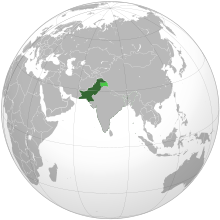Pakistan: Why Is The Military Not Opening A Front In North-Waziristan? – Analysis
By IPCS
By Sander Ruben Aarten
Over the years, North-Waziristan (NWA) has become the center of Taliban-affiliated terrorism. Concurrently, Pakistan has met heavy international pressure to launch an attack on terrorist safe havens inside NWA. Pakistan has announced and subsequently cancelled military operations in NWA on several occasions. Why is Pakistan so reluctant about launching an attack in NWA?

There seems to be a relation between increased US pressure on Islamabad and Pakistani announcements of an impending attack in NWA. In 2011, for example, the Pakistani Army made vague allusions about an operation inside NWA. However, a month after US Admiral Mike Mullen called the Haqqani network “a veritable arm” of Pakistan’s ISI directorate and accused the ISI of supporting the network as it launched an attack on the US embassy in Kabul, Pakistan’s Foreign Minister announced that 35,000 troops stood ready to launch the offensive. The offensive never materialised.
Similarly, in June 2012, the US Secretary of Defence Panetta said that Pakistan was “reaching the limits of our patience” and hinted at stepping up the drone attacks. Two months later, Pakistan’s Chief of Army Staff General Kayani announced that an attack on al Qaeda-affiliated terrorist groups such as the Haqqani network was imminent. A few weeks later, Interior Minister Rehman Malik stated that an operation was “not on the cards.” Apparently, another operation called ‘Tight Screw,’ was already launched to put pressure on militant strongholds in the region. Until today, very little is known about when, where, or even if ‘Tight Screw’ has been launched.
Keeping in mind its track record thus far, Pakistan may be wary of opening a new front in NWA. Between 2002 and 2009 the Pakistani Army launched a series of major offensives in and around FATA. These operations, which were primarily targeted against anti-Pakistani groups such as the Pakistani Taliban (TTP), have been of limited success for two reasons. First of all, while concentrating on destroying militant strongholds, they never managed to fully sanitise the region. At best, these operations resulted in a temporary disruption of militants’ activity, who would then either re-infiltrate the area or move base to another region. In its struggle against domestic terrorism, the army has suffered over 3500 casualties – a number that is higher than the total casualty rate of all NATO forces in Afghanistan combined.
Another undesired result was that the operations provided a breeding ground for anti-Pakistani sentiments among the population. The army did not shy away from using harsh measures; in 2008 alone more than 4000 houses were destroyed by the army in South-Waziristan, and in 2009 a series of campaigns in Swat and Malakand resulted in more than 3 million internally displaced persons. Compounding the issue, resettlement and reconstruction efforts of the federal government were hopelessly inadequate. Consequently, the TTP would cast the army and government as apostate entities, waging war against their own population, on behalf of foreign infidels. This is reflected in the upsurge in domestic terrorism since 2008.
Further, NWA provided sanctuary to two militant organisations that advance Pakistani geostrategic interests. First, the Haqqani network, which is an integral part of the Afghan Taliban, has its headquarters and several training grounds around NWA’s capital Miramshah. Pakistan, still in pursuit of strategic-depth vis-à-vis India, has an interest having a compliant government in Kabul and therefore continues to support the network via the ISI. Second, NWA provides sanctuary to Lashkar-e-Taiba (LeT) which focuses on India and Kashmir being responsible for the Indian Parliament and Mumbai attacks in 2001 and 2008.
In addition to the Haqqani network and LeT, other organisations such as al Qaeda, TTP, and the Islamic Movement of Uzbekistan (IMU) are present in NWA too. Worryingly though, these organisations are known to be cooperating and pooling their resources and ideologies – effectively cross-pollinating. For example, last year a Haqqani Network spokesman warned it would shift focus to Pakistan if the latter was to attack. Similarly, an IMU cleric warned that it would fight for the imposition of Sharia in Pakistan and the destruction of the Pakistani army, should operations eventuate.
The India-factor may well be another reason why Pakistani strategists are reluctant to start an offensive in NWA. As Praveen Swami rightly noted in The Hindu, an all-out and prolonged internal conflict implies that Pakistan would be forced to drain its focus and military resources away from its powerful adversary in the east.
Pakistan is therefore likely to think twice before opening a new front in NWA. Any military operations in the region are likely to be self-defeating. Previous military campaigns have failed, resulted in a blowback that led to an upsurge in domestic terrorism, and reduced public support of the federal government. Moreover, Pakistan would alienate the sub-state entities that are a critical part of its foreign power projection – the LeT and Haqqani Network. Furthermore, it would imply a shift of its traditional military focus on its eastern border to its western border. Thus, announcements of an impending offensive are merely a public relations tool designed to temporarily deflect US pressure on Pakistan to take tougher actions against militant’s sanctuaries.
Sander Ruben Aarten
Research Intern, IReS, IPCS
email: [email protected]
